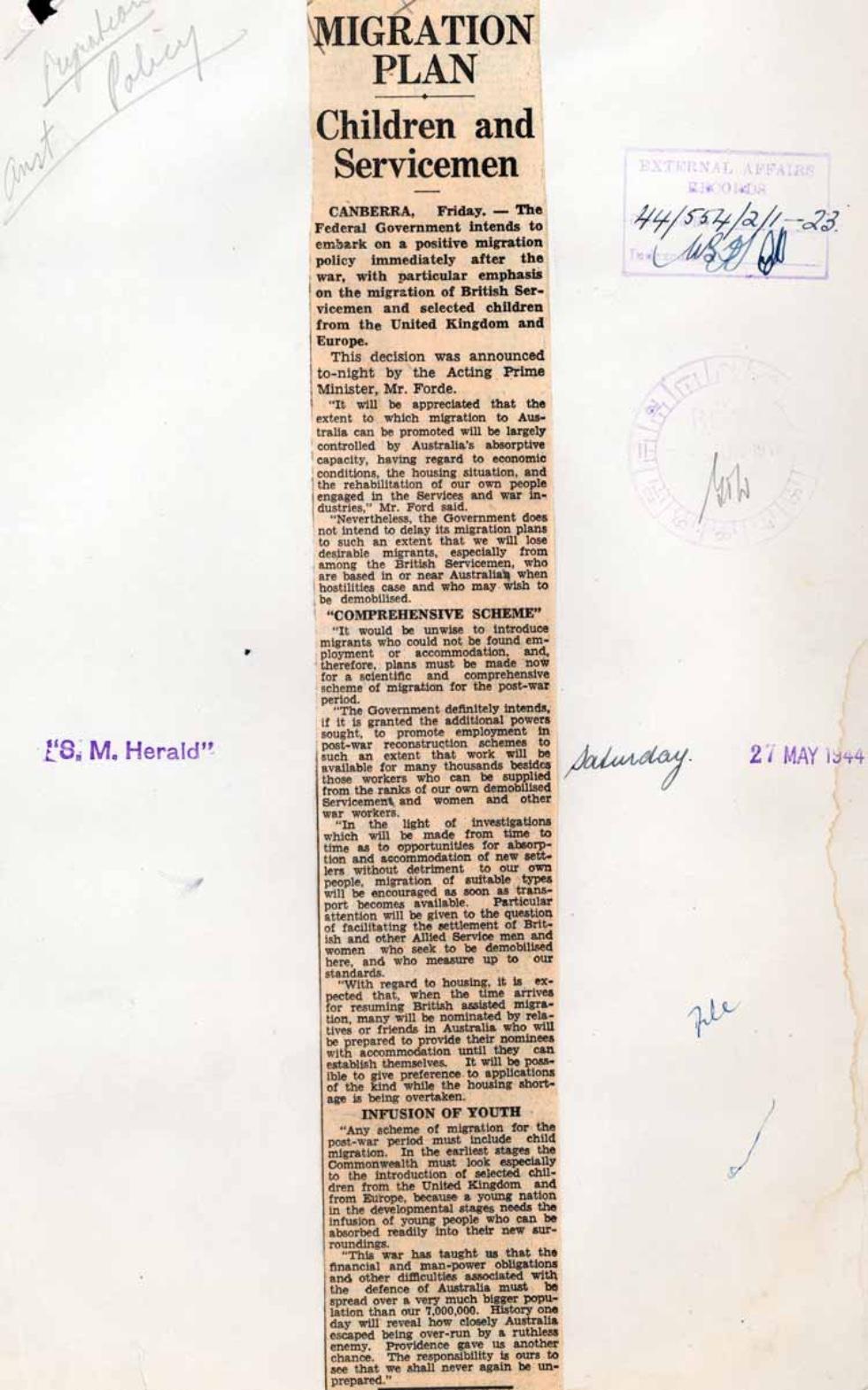
Newspaper article
Aboriginal and Torres Strait Islander people should be aware that the National Archives' website and collection contain the names, images and voices of people who have died.
Some records include terms and views that are not appropriate today. They reflect the period in which they were created and are not the views of the National Archives.


Newspaper article
[Newspaper clipping attached to a piece of blank paper with several stamps and annotations, including 'Aust Migration Policy' handwritten in pencil, ' "S.M. HERALD" ' stamped in purple ink, and 'Saturday 27 MAY 1944' with the day written in black pen and the date stamped in purple ink.]
[Main heading] MIGRATION PLAN
[Subheading] Children and Servicemen
CANBERRA, Friday. – The Federal Government intends to embark on a positive migration policy immediately after the war, with particular emphasis on the migration of British Servicemen and selected children from the United Kingdom and Europe.
This decision was announced to-night [sic] by the Acting Prime Minister, Mr. Forde.
"It will be appreciated that the extent to which migration to Australia can be promoted will be largely controlled by Australia's absorptive capacity, having regard to economic conditions, the housing situation, and the rehabilitation of our own people engaged in the Services and war industries," Mr. Ford said.
"Nevertheless, the Government does not intend to delay its migration plans to such an extent that we will lose desirable migrants, especially from among the British Servicemen, who are based in or near Australia when hostilities case [sic, possibly meant 'cease'] and who may wish to be demobilised.
[Subheading] "COMPREHENSIVE SCHEME"
"It would be unwise to introduce migrants who could not be found employment or accommodation. and, therefore, plans must be made now for a scientific and comprehensive scheme of migration for the post-war period.
"The Government definitely intends, if it is granted the additional powers sought, to promote employment in post-war reconstruction schemes to such an extent that work will be available for many thousands besides those workers who can be supplied from the ranks of our own demobilised Servicemen and women and other war workers.
"In the light of investigations which will be made from time to time as to opportunities for absorption and accommodation of new settlers without detriment to our own people, migration of suitable types will be encouraged as soon as transport becomes available. Particular attention will be given to the question of facilitating the settlement of British and other Allied Service men and women who seek to be demobilised here, and who measure up to our standards.
"With regard to housing, it is expected that, when the time arrives for resuming British assisted migration, many will be nominated by relatives or friends in Australia who will be prepared to provide their nominees with accommodation until they can establish themselves. It will be possible to give preference to applications of the kind while the housing shortage is being overtaken.
[Subheading] INFUSION OF YOUTH
"Any scheme of migration for the post-war period must include child migration. In the earliest stages the Commonwealth must look especially to the introduction of selected children from the United Kingdom and from Europe, because a young nation in the developmental stages needs the infusion of young people who can be absorbed readily into their new surroundings.
"This war has taught us that the financial and man-power obligations and other difficulties associated with the defence of Australia must be spread over a much bigger population than our 7,000,000. History one day will reveal how closely Australia escaped being over-run by a ruthless enemy. Providence gave us another chance. The responsibility is ours to see that we shall never again be unprepared."
Learn how to interpret primary sources, use our collection and more.
